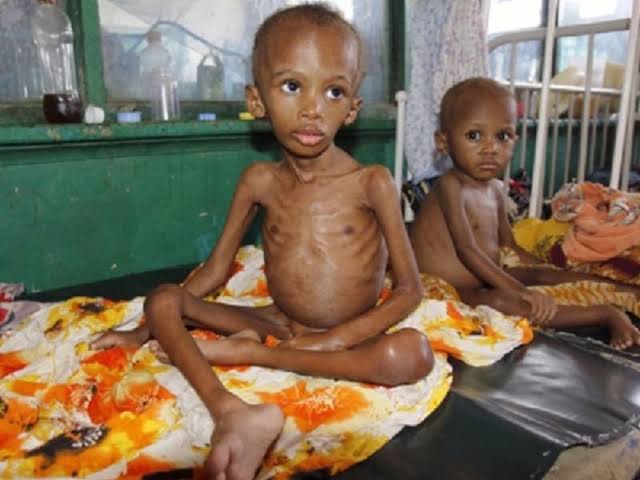A Child’s Cry: Nigeria’s malnutrition crisis demands urgent action

By Mohamed Malick Fall, United Nations Resident and Humanitarian Coordinator in Nigeria
On a sweltering afternoon in Katsina, Fatima cradles her two-year-old son, Musa, in a crowded therapeutic feeding center. His frail body, barely clinging to life, tells a story that words cannot. Musa is one of millions of Nigerian children facing the brutal reality of severe acute malnutrition—a condition that makes a child 9–12 times more likely to die than if they were well nourished. But Musa is also a symbol of hope. With timely treatment, he is slowly recovering. His story is a reminder that malnutrition is not a death sentence—it is a preventable tragedy.
During this lean season, as we reflect on the courage and sacrifice of humanitarian workers across the globe, we must also confront the escalating malnutrition and food security crisis in Nigeria. The scale of suffering is staggering, and the urgency to act has never been greater.
A Crisis Too Vast to Ignore
According to the March 2025 Cadre Harmonisé—a food security survey—nearly 31 million people across 26 states and the Federal Capital Territory face acute food insecurity. When extrapolated nationwide, this leads up to 40 million, surpassing the population of many countries. This is not just a statistic—it is a humanitarian catastrophe.
Nigeria now bears the highest burden of malnutrition in Africa, with 15 million children under 5 affected by different forms of malnutrition. Of these, 3.5 million could fall into severe acute malnutrition (SAM). In six northern states—Borno, Adamawa, Yobe, Sokoto, Zamfara, and Katsina—2.5 million children are at risk. But the crisis is no longer confined to the north. Southern states like Delta, Rivers, Akwa Ibom, Oyo, and Osun are now witnessing rising cases of acute malnutrition, signalling a nationwide emergency.
Humanitarian Lifelines at Breaking Point
Despite the tireless efforts of humanitarian organizations, the system is overwhelmed. In facilities where children can be treated for malnutrition, we are witnessing a situation where often two children need to share a single hospital bed. Children are also coming to treatment centres with increasingly severe conditions, resulting in the risk of higher death rates. Alarmingly, signs of malnutrition are now visible among some adults in certain parts of the country, mainly among displaced populations.
The deterioration is worsening in unexpected ways. Health systems are stretched beyond capacity, and households have exhausted their coping mechanisms. Without immediate funding, humanitarian actors will be forced to make heart-wrenching decisions about who receives help—and who does not. Already, the World Food Programme food pipeline is expected to break by the end of August/early September, and UNICEF’s therapeutic supplies will run out by the end of September.
Malnutrition Is Preventable—But Time Is Running Out
Malnutrition is entirely preventable and treatable. But the clock is ticking. Every minute without funding puts more children at risk. However, global and domestic funding shortfalls are impacting life-saving work. This is resulting in the closure of treatment and preventive services—for instance, implementing partners are closing across the north. We need urgent and decisive action to prevent a catastrophe. The consequences of delayed action are dire. 420,000 children under five are at risk of dying from malnutrition by the end of this year. That means 2,000 children could die—mainly during this lean season—from preventable causes.
A Call to Action
We call on the Government of Nigeria, international partners, the private sector, and friends of Nigeria to step up with immediate and sustained funding for food and nutrition support. Humanitarian organizations are ready to scale up—but we cannot do so without resources. The next 3–6 months are critical. If nothing is done now, children’s lives will be at stake.
Investing in Nigeria’s Future
Children like Musa have immense potential. But malnutrition in early life can lead to irreversible physical and cognitive damage. If we fail to act, we risk losing an entire generation to hunger and disease. But if we act now, we can change the trajectory of millions of lives. We also urge for long-term investments in resilient, locally led solutions. Nutrition is not just a humanitarian issue—it is a development imperative. Every dollar, every naira invested in nutrition is an investment in Nigeria’s future.
During this lean season, let us also honour the memory of those we have lost by acting with urgency and compassion. Let us reaffirm our commitment to Nigeria’s children and families. Let us stand together—guided by humanitarian principles and solidarity—to save lives and restore hope.
Because no child should die from a preventable cause. Not today. Not ever.
Mohamed Malick Fall is the United Nations Resident and Humanitarian Coordinator in Nigeria
The post A Child’s Cry: Nigeria’s malnutrition crisis demands urgent action appeared first on Vanguard News.







